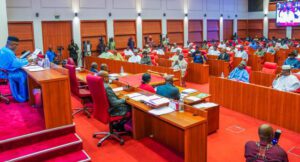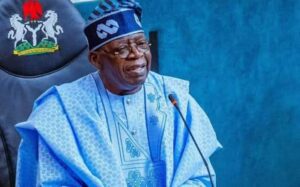Asari Dokubo allegation: Reveal names of crude oil thieves — Nigerian Navy
…No black sheep will be spared — Army
…Discipline erring military officers, publish list of operations — Sahara Energy Co-founder
By Ibiyemi Mathew
The Nigerian Navy has challenged Asari Dokubo to reveal the names of military officers who are involved in crude oil theft.
Asari Dokubo in a visit to President Bola Ahmed Tinubu on Friday had accused the Nigerian Army and Nigerian Navy of being liable for 99 per cent of crude oil thefts.
Responding to the accusation, the Nigerian Navy spokesman, Commodore Adedotun Ayo-Vaughan challenged Dokubo to reveal the names of officers involved in crude oil theft.
He noted that the allegation against the military is spurious and unguarded.
Commodore Ayo-Vaughan said oil thieves were angry because the land, maritime and air component of the Joint Task Force Operation Delta Safe as well as other operations in the South-South zone of the country have sustained the efforts to deny oil thieves avenues to sabotage the economy through ongoing “Operation Dakatar Da Barawo” and sustained a relatively safe and peaceful environment for business activities to strive in the region.
“If Asari Dokubo is seeking some form of relevance and he alleges that there are cabals of military personnel who are involved in crude oil theft, let him bring the names.
“Nobody is afraid of getting the names of those involved in crude oil theft. You cannot make such serious allegations and think that we just sweep it down the carpet, there will be an official response from Defence Headquarters on this matter.
“The Chief of Defence Staff does not condone that, nor does the Chief of Naval Staff under whom I serve.
“The Nigerian Navy as an organisation is actively involved in the fight against crude oil theft and the resources in the Niger Delta. So, for anybody to say there is a cabal of military officers, the only simple thing is bring the evidence, bring the names,” he noted.
In an interview on Channels TV on Sunday night, Mr Tonye Cole said the allegation by Dokubo is true stating that the military cannot deny that they don’t know that it is true.
He however noted that attributing 99 per cent crude oil theft to the military is false.
“The military annoyance comes from the fact that Asari Dokubo accuses them of 99 per cent involvement in crude oil theft. To say 99 per cent is to say that the military is solely responsible for the problem in the Niger Delta.
“They will not deny that there are bad eggs that aid and abet. When the military catches any of them, they discipline them. Everyone in the ecosystem is part of the blame and we all need to sit down to address the issue,” he said.
Speaking further, Mr Tonye Cole, an APC chieftain in Rivers State and Co-founder of Sahara Energy noted that “the problem in the Niger Delta is that they have weaponised poverty to such an extent that economic activities around crude oil bunkering is now one of the sources of financing and we need to address it.
“If 20 years ago we were doing 2.4 million barrels per day (bpd), apart from general maintenance we should at least be able to maintain 2.4 mbpd.
“That it is going down means there is a big problem when production drops more than half. It must worry us as a country.
“The issue is that alot of our oil are being siphoned. Pipelines have multiple areas from which they have been unplugged and they are being depleted.
“If we wanted to know the exact point where oil is being siphoned, we will know. So, it requires very strong political will to tackle the issue of oil theft.
“There is a second part which we must address. It is an economic issue. If you want to stop them, you have the kingpins and the underlings who are beneficiaries. You have to address them and not just those who sit on top.
“We must get into the Niger Delta and make the people know that they are part of the solution. President Tinubu will first need to have a multifaceted discussion with the people of the Niger Delta who are having a brunt of it.” he stressed.
Mr Cole also advised President Tinubu to speak to the military about Civil military organization (CIMEN) which has deployed effectively in the North East of Nigeria and also globally.
“Using force alone won’t work. The CIMEN is part of the solution that can be deployed because it begins to have an interaction with those who are victims, perpetrators to find the solution as to what can be done.”
He also encouraged the military to make examples of bad eggs to send a message and also showcase some of the operations that have been carried out so people can be more aware of their operations.
The Director, Army Public Relations, Brig.-Gen. Onyema Nwachukwu, has also said that no black sheep will be spared if identified in illegal oil bunkering.
According to Brig.-Gen. Onyema, the Nigerian army had been vigorously engaged in the fight against illegal oil bunkering, oil theft, illegal oil refining and other sundry crimes in the region with positive results.
Nwachukwu who spoke on Friday in Abuja, said the intervention had produced positive results.
This, he said, was evident in the increase in daily oil production from an abysmally dwindling output in the past.
“The Nigerian Army has been vigorously engaged in the fight against illegal oil bunkering, oil theft, illegal oil refining and other sundry crimes in the Niger Delta.
“And this has yielded positive results as evident in the increase in daily oil production per barrel from an abysmally dwindling output in the past.
“The Nigerian Army has zero tolerance for any compromise on the part of our troops and will not condone such acts of economic sabotage,” he said.




